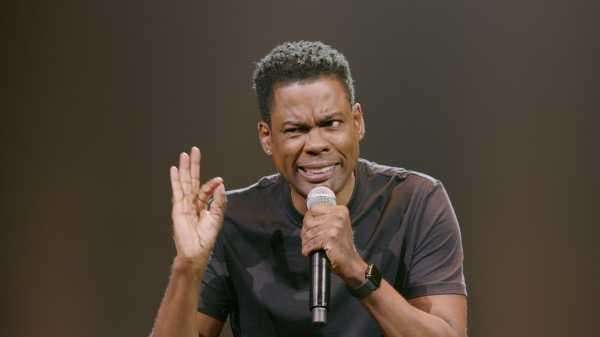
“America is insane,” Chris
Rock says,
with good reason, during “Tamborine,” his new Netflix comedy special.
The observation works like a semicolon, linking two separate but
intimately connected structures of thought. Rock has just finished
talking about police violence, and he is on his way into a bewildered
bit about the larger scourge of gun violence. “This gun shit ain’t going
nowhere, O.K.?” he continues. “There ain’t never gonna be no gun
control. You talk about it too long, you will get shot.” The cynicism is
classic Rock. In one of his old routines, on the corruption of the
pharmaceutical industry and the capitalistic drive that underpins it, he
declared, in almost identical cadence, “They ain’t never curing AIDS.
Don’t even think about that shit . . . ’Cause ain’t no money in the
cure. The money’s in the medicine. That’s how you get paid!” But
“Tamborine” was released at midnight on Wednesday, only hours before a
nineteen-year-old kid in Parkland,
Florida,
allegedly walked into Marjory Stonemason Douglas High School and killed
fourteen students and three staff members. Watching the special this
week, in counterpoint with the news, I found Rock’s pessimism about our
legal and moral regime even bleaker than usual—if too dully accurate, by
all available evidence, to feel especially prophetic.
Rock’s insistence on stasis stands in stark contrast to the
galvanizing and tremendously moving
activism that has come, with an impressive, hopeful
poise, from several of the young classmates of the dead. “Tamborine,” with its
focus on the grim business of growing up, suggests a simple cause for
their incommensurability: when you get old, you sour somewhat, whether
you’d like to or not. Rock is as edgy and epigrammatic as ever, but one
notices a certain sanded-down quality. His last special, “Kill the
Messenger,” débuted a decade ago, on HBO, home to each of Rock’s standup
showcases until this one. (His departure for Netflix feels almost
bittersweet, like a changing of the guard.) “Kill the Messenger” showed
Rock delivering his jokes to huge, rapturous audiences on stages in New
York, London, and Johannesburg, roaming each one as if in search of
prey, performing at his hungry, bombastic best. In “Tamborine,” his
motions are more minute, if just as deliberate. Sometimes, on the way to
a point, he does a little skip step, like a subdued Tito Jackson. He
still hooks his thumb into a kind of claw when he points outward, but
the hand that’s free from the microphone is now in his pocket almost as
often as it’s in the air. In place of the snazzy, often shiny suits that
have been his usual attire, he wears a black T-shirt and black jeans,
livened up only slightly by two stud earrings and a pair of
trendy-looking kicks. He complains, at one point, about the constancy of
contact in our technological age: “You can’t miss nobody in 2017!” His
black Apple watch reads as a sign of surrender.
Much of the material in the first half of the special reflects how
little in American society has changed since Rock was a kid. He trains
his daughters—privileged though they are, a generation and many millions
of dollars removed from the struggles of his own youth, in Brooklyn—in
avoiding racial trouble. In his home, he says, “we don’t have fire
drills, we have whitey drills.” The cops remain a problem, and it’s
still his instinct to distrust them. “On the other hand,” he muses, “I
own property.” Schools might be more vigilant about bullies, but Rock
believes that bullies are necessary for an education in the things that
matter. “Nobody cares if you can code,” he says, pronouncing that verb
with a bit of derision towards its newish meaning, “if you cry if your
boss doesn’t say hi.”
The downbeat, old-head-speaks-truth vibe of the special is reinforced by
its unusually baroque and psychologically probing direction, provided by
another comic, Bo Burnham. (Burnham, who also directed Jerrod
Carmichael’s “8,” one of my favorite specials of the past few years,
recently premièred his début feature film, at Sundance.) When Rock grows
sombre in a moment of lacerating self-disclosure, the shot draws
uncomfortably close to his face, revealing the guilty, squirming muscles
of his brows and cheeks, each dart of his eyes, and the gradual return
of control as he turns his penance into a punch line. I found myself
wondering whether Burnham, in preparing to shoot “Tamborine,” had
studied Rock’s recent movie “Top Five.” The works are tonal twins: both
are hilarious but grounded, and each tells the story of an
astronomically successful comedian whose safe realities have begun to
crumble but who can glimpse, however softly, the shape of a new life.
For all of Rock’s fealty to hard fact and the disenchantments of
experience, “Tamborine” is most exciting, and most unlike anything he’s
done before, when he gropes toward transformation. Toward the middle of
the special, Rock, who was recently divorced, admits that his marriage
failed, in part, because of his own infidelity. From there, he doesn’t
simply wallow in his faults—the disloyalty, the entitled attitude, the
addiction to Internet porn—but, under the guise of offering his audience
advice, opens up the possibility that, when sufficiently chastened, a
person can change. He’s even decided to give religion a chance. “Just a
little,” he says, slurring little so that it sounds even littler:
luh. “I’m trying to find God before God finds me,” he says. Rock’s God
isn’t cuddly, or even perfect. To Rock’s mind, He may have instituted
the Sabbath because creation had already gone haywire—to offer Him your
human “help,” whether by regular church attendance or zealous extremism,
reveals your own insane bravado.
When Rock first mentions his divorce, a few audience members offer quick
whoops and claps. They know, even before he does it, that he’ll turn his
misfortune into laughs. But Rock insists on a pause to acknowledge the
seriousness of his situation: “Don’t clap for that shit,” he says,
“unless you’re a lawyer.” The moment makes the two halves of “Tamborine”
cohere. It takes a whole flood of harsh experience—even, sometimes, a
lifetime—to achieve a lasting conversion. It takes force to sand down
the stone. Or, as Rock puts it, “Pressure makes diamonds—not hugs.”
This might be the wisdom of those bright, tough, brave kids in Parkland.
There’s a kind of moral disaster in jadedly digesting the new shooting
as just a float in the parade of others, in understanding tragedy as
trope. The students have fresher eyes—I keep wondering how much they
know about Columbine or Sandy Hook—but seem, already, to understand the
political forces arrayed against the change they’d like to see.
Awareness of imposing structures, but belief in evolution, powered by
pain, realized one heart at a time: it sounds like the beginning of an
intelligent politics, or even a humane and effective radicalism. Rock
makes it funny, but I hope the kids make it true.
Sourse: newyorker.com






